ZEN IRODALOM ZEN LITERATURE
« Zen főoldal
« vissza a Terebess Online nyitólapjára

玄沙師備 Xuansha Shibei (835-908)
(Rōmaji:) Gensha Shibi
Tartalom |
Contents |
| Hszüan-sa Si-pej mondásaiból Fordította: Terebess Gábor |
HSUAN-SHA XUANSHA SHIBEI Encounter Dialogues of Xuansha Shibei Claiming Buddhahood in Song-era Chan: The Case of Xuansha Shibei (starting on page 383) |
HSUAN-SHA
Translated by Thomas Cleary
In: The five houses of Zen, 1997
Sayings
HAVE YOU ATTAINED the pure, original ocean of insight and knowledge of essence and forms? If you haven’t attained it yet, now that you are gathered here, do you see the green mountains before you? If you say you see, how do you see? If you say you do not see, how can you say the green mountains are not visible? Do you understand?
The fact is that your pure, original ocean of insight and knowledge of essence and forms includes seeing and hearing. If you understand, it is just so, and even if you don’t understand, it is still just so.
Everything is always so; every essence is as such; just do not seek outside. If you have a great root of faith, then the buddhas are nothing but your own inner experience; whether you are walking, standing still, sitting, or reclining, never is it not so.
But now that I’ve told you this directly, already I am oppressing your freedom, making you slaves. Would you agree to say so? Whether you agree or not, how do you understand?
Now this talk is already showing ignorance of good and bad. How so? Because you discriminate this way and that way.
What are you all taking such pains in search of? Don’t tell me to flap my lips! Why? There is nothing accomplished by talk alone; it is not words that can bring people peace. You must experience unity and suchness before you attain harmony; don’t just memorize sayings and expressions, for there is no end to that. It’s just a matter of total concentration. Don’t say you have to attain the function of the sages before you can be free; how are you unequal to them?
The emergence of buddhas in the world exercising kindness and compassion has been all along like flowers in the sky, without solid reality. You should realize that there is that which has never emerged in the world and has never entered extinction.
Illusory manifestations and illusory names have no reality. Why? The essential nature of the material elements is fundamentally actually empty, so it has never passed away and never come to be, and it has never taught people.
Because the essential nature of beings is such, their material bodies are also such. Because the essential nature of beings is nirvanic, their material bodies are also nirvanic. But do you realize this?
If you do, then come forth and we’ll all discuss it. If not, I now tell you that intrinsic essence does not produce intrinsic essence, and intrinsic essence does not annihilate intrinsic essence.
Then how can one attain understanding? Don’t say this essential nature is as ever. If you understand, please express your understanding to the people; if you do not understand, then how are you not comparable to the buddhas?
This is how you must be before you attain. Those of higher faculties comprehend everything once they hear; those of middling faculties also comprehend once they hear; and those of lesser faculties also comprehend once they hear. What am I talking about with this reasoning? Do you know? Do you have insight?
It is inherent in everyone; it is manifest in everyone.
The first axiom of Zen is to personally accept the completeness of present actuality. There is no other in the whole universe; it is just you. Who else would you have see? Who would you have hear? All of it is the doing of your mind monarch, fulfilling immutable knowledge. All you lack is personal acceptance of the realization. This is called opening the door of expedient methodology, to get you to trust that there is a flow of true eternity that pervades all time. There’s nothing that is not it and nothing that is it.
This axiom only amounts to equanimity. Why? It is just using words to dismiss words, using principle to chase principle, teaching people equilibrium and constancy in essence and in manifestation for their own benefit. In terms of Zen, this is still understanding what comes before but not understanding what comes afterward. This is called uniform ordinariness, the experience of partial realization of the body of reality.
Without expression beyond patterns, you die at the statement and do not yet have any freedom. If you know experience beyond patterns, you will not be compelled by mental demons; they come within your power, and you can transform them effortlessly. Your words communicate the great Way, without falling into the view of even-mindedness. This is called the first axiom of Zen.
The second axiom is returning to causality and attending to effects, not sticking to the principle of constant oneness. This is expediently called turning from state to potential, enlivening and killing freely, granting and taking away as appropriate, emerging in life and entering in death, bringing benefits to all. Transcendently free of material desires and emotional views, this is expediently called the buddha nature that goes beyond the whole world all at once. This is called simultaneous understanding of two principles, equal illumination of two truths. Unmoved by dualistic extremism, subtle functions become manifest. This is called the second axiom of Zen.
The third axiom is to know that there is a root source of the nature and characteristics of great knowledge and to penetrate its infinite vision, understanding both the negative and the positive, comprehending the universe. The enhanced function of the one real essential nature becomes manifest, responding to developments without convention. Functioning completely without any effort, totally alive without any initiative, this is expediently called the method of concentration of compassion. This is the third axiom of Zen.
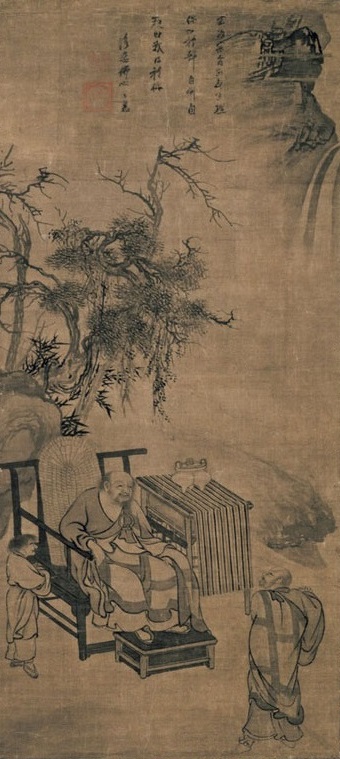
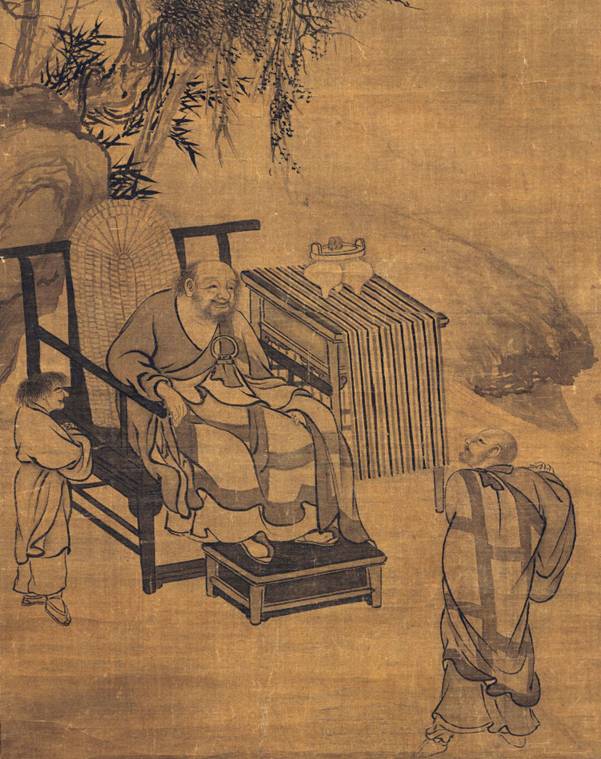
Xuefeng Receives his Student Xuansha 雪峰接玄沙生圖
Attributed to Muxi Fachang 牧谿法常 (13th century) Late 13th century, Yuan (1271-1368)
Encomium by Yuji Zhihui 愚極智慧 (act. 1298) Hanging scroll, ink on silk, 102 x 46 cm Kyoto National Museum, AK672 Important Cultural Property
Encomium:
Xuan Sha's teachings have no special rationale,
You pay obeisance to me, prostrating yourself and getting up,
As I pay obeisance to you.
[Signed] Jingci Foxin Zhihu. 玄沙宗旨, 別無道理, 你為禮拝, 自倒自起, 因我得禮你。 淨慈佛心,智慧。
XUANSHA SHIBEI
IN: Zen's Chinese heritage: the masters and their teachings
by Andy Ferguson
Boston: Wisdom Publications, 2000. pp.
297-300.
XUANSHA SHIBEI (835–908) was a disciple of Xuefeng Yicun. He came from ancient Fuzhou. As a young man he lived as a fisherman on the Nantai River. At the rather late age of thirty he left lay life to enter a temple on Lotus Mountain. Later he was ordained by the Vinaya master Lingxun at Kaiyuan Temple in Yuzhang (near modern Nanchang). He carried on an ascetic practice, wearing only a patched robe and straw sandals. He often fasted instead of taking the evening meal, and was regarded as unusual by the other monks. He was called “Ascetic Bei.” His relationship with Xuefeng was like that of a younger brother. As his close disciple, Xuansha worked with Xuefeng to build his teacher’s practice center. He is said to have awakened one day upon reading the words of the Surangama Sutra.
After leaving Xuefeng he first lived at the Puying Monastery. Later he moved to Xuansha Mountain in Fuzhou, where he remained for the next thirty years. The governor of Min honored him, presenting him with the purple robe and the title “Great Teacher of the One Doctrine.”
One day, Xuefeng asked Xuansha, “What is Ascetic Bei?”
Xuansha said, “I dare not deceive people.”
Another day, Xuefeng called out to Xuansha, saying, “Why doesn’t Ascetic Bei go off to practice at other places?”
Xuansha said, “Bodhidharma didn’t come from the west. The Second Ancestor didn’t go to India.”
Xuefeng approved this answer.
One day, Xuefeng entered the hall and addressed the monks, saying, “If you want to understand this matter, it’s like looking into an ancient mirror. If a foreigner comes, a foreigner is revealed. If a Han comes, a Han is revealed.”138
Xuansha said, “If the clear mirror suddenly comes forth, then what?”
Xuefeng said, “The foreigner and Han are both hidden.”
Xuansha said, “The master’s feet still don’t touch the ground.”
After Xuansha became the abbot at Mt. Xuan Sha, he entered the hall and addressed the monks, saying, “Buddha’s way is vast and serene. There is no path on which to travel there. There is no gate of liberation. There are no thoughts about a ‘person of the Way.’ There are no ‘three worlds.’ Therefore one cannot ‘transcend’ or ‘fall into.’ Setting something up runs counter to the truth. Negation is a formation. Movement gives rise to the root of birth and death. Stillness is the province of falling into delusion. When movement and stillness are extinguished, one falls into empty negation. When movement and stillness are both accepted, buddha nature is concealed. With respect to worldly affairs or states of mind, you should be like a cold dead tree. Then you will realize the great function and not forfeit its grace. All forms will be illuminated as if in a mirror. Brightness or obscurity will not confuse you. The bird will fly into emptiness, it will not be apart from empty form. Then in the ten directions there will be no form and in the three worlds there will be no traces.”
The following passages are from The Record of Zen Master Xuansha Shibei.
One day Xuansha entered the hall but remained silent. The monks grew tired of waiting for him to expound the Dharma, and after a time all of them got up to leave the hall. Xuansha called out, “See, they’re all the same! Not a single one with wisdom! You see my two lips here and you cluster around seeking to get meaning out of some words. When I really bring it forth, none of you know it. Look! So hard! So difficult!”
Once Xuansha said, “All of you practitioners of Zen, you’ve traveled here from every quarter on foot, asking me to help you practice Zen and study Tao. You’ve taken this place to be special, and when you get here you ask every sort of question. Since this is what you’ve done, then you should check this place out thoroughly! Haven’t I been completely forthcoming with you? I extinguish what you know. Then what is there left? If nothing is left, then of what use is your knowledge? Since you’ve come here I now ask you, do any of you have the eye of wisdom or not? If so, then let us see it now. Can we see it? If not, then I call you all blind and deaf. Is that it? Are you willing to speak up in this manner? Virtuous Zennists do not willingly submit. Are you authentic monks? The top of your head is exposed to all buddhas in the ten directions. You don’t dare show the slightest error!”
Xuansha gave instruction to the congregation, saying: “The great masters everywhere speak extensively of reaching and benefiting beings. If they encountered three persons with different disabilities, how would they reach them? For a blind person, if they wielded the staff or raised their whisk then the person would not see it. For a deaf person, if they spoke of samadhi, then he would not hear it. For a mute person, if they called on him to speak, he could not do so. So what would they do to reach them? If these types cannot be reached, then the Buddhadharma has no effect.”
Zen master Xuansha said to the monks, “All of you are seeing great peril. You see tigers, knives, and swords threatening your life, and you’re experiencing unlimited terror. What’s it like? It is like the world is painting itself with images from hell, making tigers, knives, and swords, all right there in front of you, and you feel terrified. But if you are now having such experiences then it’s a terror that arises from your own personal illusions, and not something that someone else is creating for you. Do you want to understand these illusions and confused feelings? If so, then know that you have the diamond-eye. If you know this, then you realize that all the things of the world don’t truly exist. So where could tigers, wolves, knives, and swords threaten you? If Shakyamuni had dealt with this like you’re doing he’d never have made it.
“This is why I say to you that the eye of a true practitioner envelops the entire world. It encompasses the whole universe. Not a single strand of hair leaks out. So where would there be a single thing left for you to see or to realize? This transcendence! This miraculous state! Why don’t you investigate it?”
Xuansha said, “It’s as if all of you are sitting on the bottom of a great ocean, completely submerged, and you’re still holding your hand out to people and begging for water. Do you understand? If you want to realize wisdom and bodhisattvahood you can do so if you have great wisdom ability. With great wisdom ability you can do it right now. But if your basic ability is somewhat lacking, then you have to be diligent and press on, day and night forgetting about food and sleep, enduring as if both your parents had died, being in just such anxiety. Give over your entire life, and with the help of other people, truly endeavoring for the truth, you’ll certainly reach enlightenment.”
A monk asked, “Why can’t I speak?”
Xuansha said, “Close your mouth. Now can you speak?”
A monk asked, “What is it? And why is it so hard to realize?”
Xuansha said, “Because it’s too close.” ([Later,] Fayan said, “It couldn’t be closer. Actually it’s the monk himself.”)
A monk said, “I’ve just arrived here and I beg the master to point out a gate whereby I may enter.”
Xuansha said, “Do you hear the sound of the water in Yan Creek?”
The monk said, “I hear it.”
Xuansha said, “That’s the place of your entry.”
Encounter Dialogues of Xuansha Shibei
compiled by Satyavayu of Touching Earth Sangha
DOC: Treasury of the Forest of Ancestors
Master Xuansha Shibei came from Fuzhou on China’s eastern seaboard. Unlike most famous monks who generally came from aristocratic and educated families, he was said to have been the third son of a family called “Xie”who lived by fishing. As a young man, he lived as a fisherman on the Nantai River.
Dogen said:
He never expected the Golden Fish, which is never hooked, but jumps into the boat of itself.
At the relatively late age of twenty-five he left his lay life and entered a monastery on Lotus Mountain to study with Master Lingxun, a disciple of Xuefeng. After receiving full ordination at a monastery in Hongzhou (Jiangxi), he returned to continue his practice with Lingxun. Shibei distinguished himself early on for his dedication to a life of simplicity, only wearing patched robes and straw sandals, and often skipping the evening meal. Because of this he was known as “Dhuta” Bei (“Dhuta” being an ancient Sanskrit designation for monks following the highest standards of simplicity). He was said to have had a deep realization on reading the Surangama Sutra.
After a year on Lotus Mountain, Shibei moved on to Elephant Bone Mountain where he began to train with Master Xuefeng Yicun, shortly after the master had established his teaching center there. The two formed a close teacher-student relationship and Shibei helped Master Xuefeng develop the monastery into a flourishing training center.
Shibei eventually decided to travel on pilgrimage to visit other masters, but just after starting out on a mountain trail he hit his toe on a rock and it started to bleed. Feeling the pain, he asked himself, “The body does not exist; where does the pain come from?” and suddenly he had a profound awakening. He then turned back and returned to the monastery.
When Master Xuefeng saw him, he asked, “What is ‘Dhuta’ Bei doing here?”
Shibei said, “From now on, I won’t deceive people.”
The master then asked, “Why isn’t Dhuta Bei going on the journey to visit other temples?”
Shibei said, “Bodhidharma didn’t come east. The second ancestor didn’t go to India.” The master approved.
After some years with Master Xuefeng, Shibei left to begin teaching on his own at nearby Primordial (Xuansha) Monastery. Master Xuefeng was still in the height of his teaching career, and so the two masters taught concurrently, remaining close friends and occasionally sharing students.
Once Master Xuefeng entered the hall and said to the assembly, “This matter is like a single rice field. Completely trust your own sowing and cultivation. There is nobody who does not receive benefit from this.”
When this was brought up to Master Xuansha Shibei, the master said, “It's like a contract is signed to sell this single field. The whole field has been sold except for one tree at the very center, but you still own the tree.”
One day Master Xuefeng said to the assembly, “All awakened ones in the three worlds turn the teaching wheel in the midst of fire.”
Master Xuansha said in response, “When the fire expounds teaching, all awakened ones in the three worlds stand and listen.”
Once when Xuansha was visiting with Master Xuefeng, they took a walk amongst some fields. At one point, Xuefeng pointed to the ground in front of him and said, “This patch of land may be suitable for building a seamless monument.”
Xuansha said, “How high should it be?”
Xuefeng looked up and down.
Xuansha said, “It’s not that you don’t have a good influence on humans and heavenly beings, but you haven’t even dreamed of the Buddha affirming the awakening of Mahakasyapa on Vulture Peak.”
Xuefeng said, “How would you say it?”
Xuansha said, “Seven or eight feet.”
Another time the two masters took a walk in the mountains. Master Xuefeng said, “I want to make this place my eternal home.”
Xuansha said, “Indeed, this place is clearly suitable for a seamless monument.”
Xuefeng immediately made a gesture of measuring.
Xuansha said, “Thant’s alright, but I don’t see it that way.”
Xuefeng asked, “How do you see it?”
Xuansha said, “It’s built!”
Xuefeng remarked, “Good, good.”
After Master Xuansha has established a community, he often taught with the saying, “The entire universe in the ten directions is one bright pearl.” Once a monk asked him, “Master, you often say that the entire universe in the ten directions is one bright pearl. How can a student like me understand this?”
The master said, “The entire universe in the ten directions is one bright pearl. What is the use of understanding?”
The next day Master Xuansha asked the monk, “The entire universe in ten directions is one bright pearl. How do you understand this?”
The monk replied “The entire universe in ten directions is one bright pearl. What is the use of understanding?”
The master said, “Now I know that you are living in the cave of demons on the black mountain.”
Dogen said:
This grass or that tree are not grass and tree, nor are the mountains and rivers
of the world mountains and rivers; they are one bright pearl...do not doubt that you
yourself are the bright pearl by thinking, “I am not the bright pearl.” Confusion and doubts,
affirmations and negations, these are nothing but the ephemeral, small responses of ordinary folk;
however, still, they are the bright pearl appearing as small, ephemeral responses...
Xuansha’s expression has made it clear that our own minds and bodies are the one
bright pearl, and so we realize that our minds are not “ours.” Who can be anxious
as to weather birth and death are, or are not, the bright pearl? Even if there is doubt or anxiety,
they are the bright pearl. There is not a single activity or thought that is not the bright pearl,
and, consequently, both advancing and retreating in the cave of demons on Back Mountain
is nothing but the one bright pearl.
One day a monk asked Master Xuansha, “What is it? And why is it hard to realize?”
The master said, “It’s too close.”
Once Master Xuansha said to the assembly, “Nowadays all Zen successors say they have received the teaching from Sakyamuni Buddha. I say that I practice together with Sakyamuni and the third son of Xie. You tell me, in what assembly do we practice together?”
When the monk Daofu first came to study with Masater Xuansha he said, “Having just arrived, I beg the master to point out a gate through which I may enter.”
The master said, “Do you hear the sound of flowing water in the creek?”
Daofu said, “I hear it.”
The master said, “Enter here.”
Hszüan-sa Si-pej összegyűjtött mondásaiból
Fordította: Terebess Gábor
Vö.: Folyik a híd, Officina Nova, Budapest, 1990, 99-101. oldal
Egy szerzetes megkérdezte Hszüan-sát:
– Amikor a hajdani mesterek felmutatták a légycsapót, kinyilatkoztatták ezzel a csan lényegét?
– Nem – mondta Hszüan-sa.
– Akkor mi értelme volt?
Hszüan-sa felmutatta a légycsapóját.
Réber László rajza– Azelőtt kinél tanultál? – kérdezett Hszüan-sa egy nemrég jött szerzetest.
– Zsuj-jen mesternél [Zsuj-jen Si-jen, 9. sz.].
– Mondj róla valamit!
A szerzetes elmesélte, hogy Zsuj-jen mindennap szólította saját magát: „Ó, mester!” „Tessék” – válaszolt rá ő maga. „Ébren vagy?” „Ébren.” „Vigyázz magadra, nehogy becsapjanak!” „Jó – tette hozzá –, vigyázok.”
– És miért nem maradtál tovább nála? – kérdezte Hszüan-sa.
– A mester eltávozott – mondta a szerzetes.
– Most, ha szólítanád: „Ó, mester!” – ahogy magát szokta szólongatni –, válaszolna-e valaki?
A szerzetes nem válaszolt.
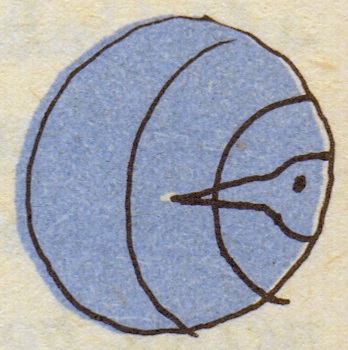
Réber László rajzaHszüan-sa már felült a szószékre. Míg a gyülekezet csendben várta, hogy megkezdje tanítóbeszédét, az udvarról behallatszott egy fecske csivitelése.
– Milyen fennkölten példálódzik a valóságról! – szólalt meg Hszüan-sa. – Milyen világosan értelmezi az Eszmét! – azzal leszállt a szószékről és visszavonult.
– Mivel kezdjem a csan tanulmányozását? – kérdezte egy szerzetes Hszüan-sától.
– Hallod a patakcsobogást?
– Hallom.
– Akkor kezdd azzal.
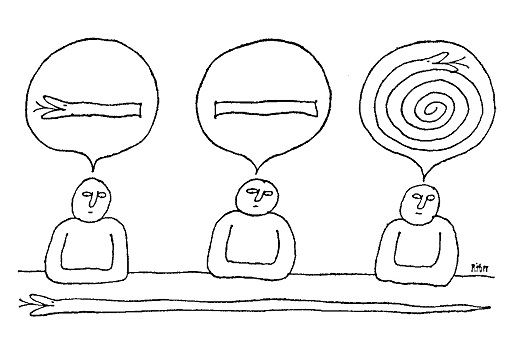
Réber László rajzaHszüe-feng kint dolgozott a mezőn tanítványaival. Észrevett egy kígyót, és felkapta a botjával:
– Ide nézzetek! – kiáltott oda a szerzeteseknek, hadd lássák, amint kettévágja késével.
Hszüan-sa ott termett, felszedte a döglött kígyó két felét, és messzire maguk mögé hajította. Aztán visszament dolgozni, mintha mi se történt volna.
Mindenki megrökönyödött.
– Milyen fürge vagy! – jegyezte meg Hszüe-feng.
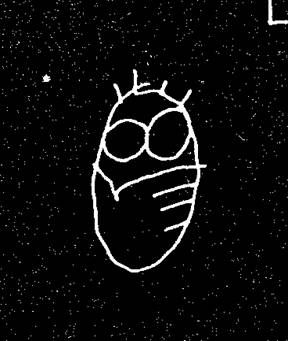
Réber László rajza– Hogyan fogadtok egy vak és süketnéma embert? – kérdezte Hszüan-sa a gyülekezettől.
– Szemem is van, fülem is van, nyelvem is van – szólalt meg Lo-han –, hogyan fogadsz engem?
– Röstellem magam – mondta Hszüan-sa, és visszament a szobájába.